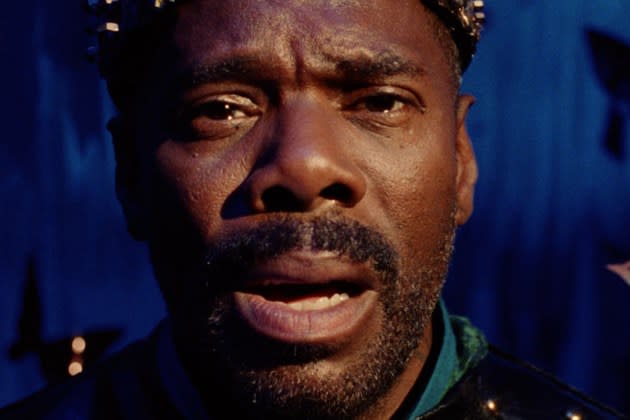‘Sing Sing’ Review: Colman Domingo Shines in a Subtle Portrait of a Prison Arts Program
- Oops!Something went wrong.Please try again later.

In his latest feature, Sing Sing, the director Greg Kwedar crafts a sincere story of friendship and artistic expression at Sing Sing, a maximum-security prison in upstate New York. Rehabilitation Through the Arts, or RTA, is a program that helps people in jail cultivate community through theater, dance and other artistic mediums. Using a mix of professional actors and alumni from the program, Kwedar chronicles the experiences of a group of incarcerated men preparing to stage a new and ambitious production. Sing Sing doesn’t set out to be an overtly political film, but its sensitive approach to portraying the lives of its characters makes it an urgent document of our time.
The riots and demonstrations of 2020 renewed conversations about the reach of the carceral state in the U.S. Abolition became a hot topic, but for those unaffected by the tendrils of the American prison system, the lives of the people inside can feel abstract. Sing Sing tries to close that distance by foregrounding the story of Divine G and Divine Eye, two men who form an unlikely bond. The film has an unhurried pace that some might find taxing. But patient audiences will find the experience rewarding, especially as the film invites independent research about the program and the filmmaking team’s own ethical production model.
More from The Hollywood Reporter
Colman Domingo plays Divine G, a mellow man who has structured his decades in prison around the group. Along with his buddy Mike Mike (Sean San José), Divine G finds purpose in staging productions by and for his community. The duo’s love for the program is evident from Sing Sing’s opening sequence, in which Divine G and Mike Mike scan the yard for potential recruits. Divine G wants to give Divine Eye — played by Clarence “Divine Eye” Maclin, on whom the character is also based — the opportunity to audition. Mike Mike worries about Divine Eye’s discipline: He is one of the most feared people at Sing Sing for his anger and aggressive approach to collecting on his debts.
Divine G brushes away Mike Mike’s concerns and they take a chance on Divine Eye. The new recruit’s struggle to embrace the radical vulnerability of the theater troupe becomes the central narrative of Sing Sing. Kwedar and Clint Bentley, who collaborated on 2021’s Jockey, team up again to write a story of friendship and second chances. Their screenplay pulls from multiple sources: the real-life relationship between Divine Eye and Divine G, alumni of the RTA program; an Esquire piece by the writer John H. Richardson; and Breakin’ the Mummy’s Code, a play written by the program’s theater director, Brent Buell. The pair are delicate in their approach to the narrative, building a process story and non-exploitative portrait of life in the correctional facility.
It turns out that Divine Eye knows more about theater than he lets on. When Divine G approaches the younger man, he’s surprised to hear him reference Shakespeare’s King Lear with a cool admiration. Their relationship starts off as one between a calm elder soul and a restless young spirit, but eventually evolves into something deeper and more interdependent.
Domingo shines, proving himself once again as an actor of wide range and deep feeling. As Divine Eye’s mentor, he channels the tough paternal energy he displayed in Euphoria in the role of Rue’s Alcoholics Anonymous sponsor. But when Divine Eye, once his protégé, questions the traditions of the program and later lands a pivotal role in the production, Divine G must confront the less flattering parts of himself. Domingo’s performance reflects the undulating texture of his character’s emotional development, from disappointment to rage unearthed by a poignant loss.
After a series of discussions about why they always stage Shakespeare, the group chooses to put on a play written by their program director (Paul Raci). The unwieldy book represents the diversity of the troupe’s interests and includes a role for everyone. Divine G, who hoped his own original play might be chosen, initially recoils at the idea of this new production, but eventually accepts it. His relationship with Divine Eye changes, too, as both men realize they have more in common than they initially thought.
Kwedar’s film is a portrait of friendship and a tribute to art’s restorative value. The helmer’s considered direction coaxes a lot of big lessons from this quiet film. Sing Sing is about the gift of creating with community and the redemptive nature of self-expression.
Best of The Hollywood Reporter
